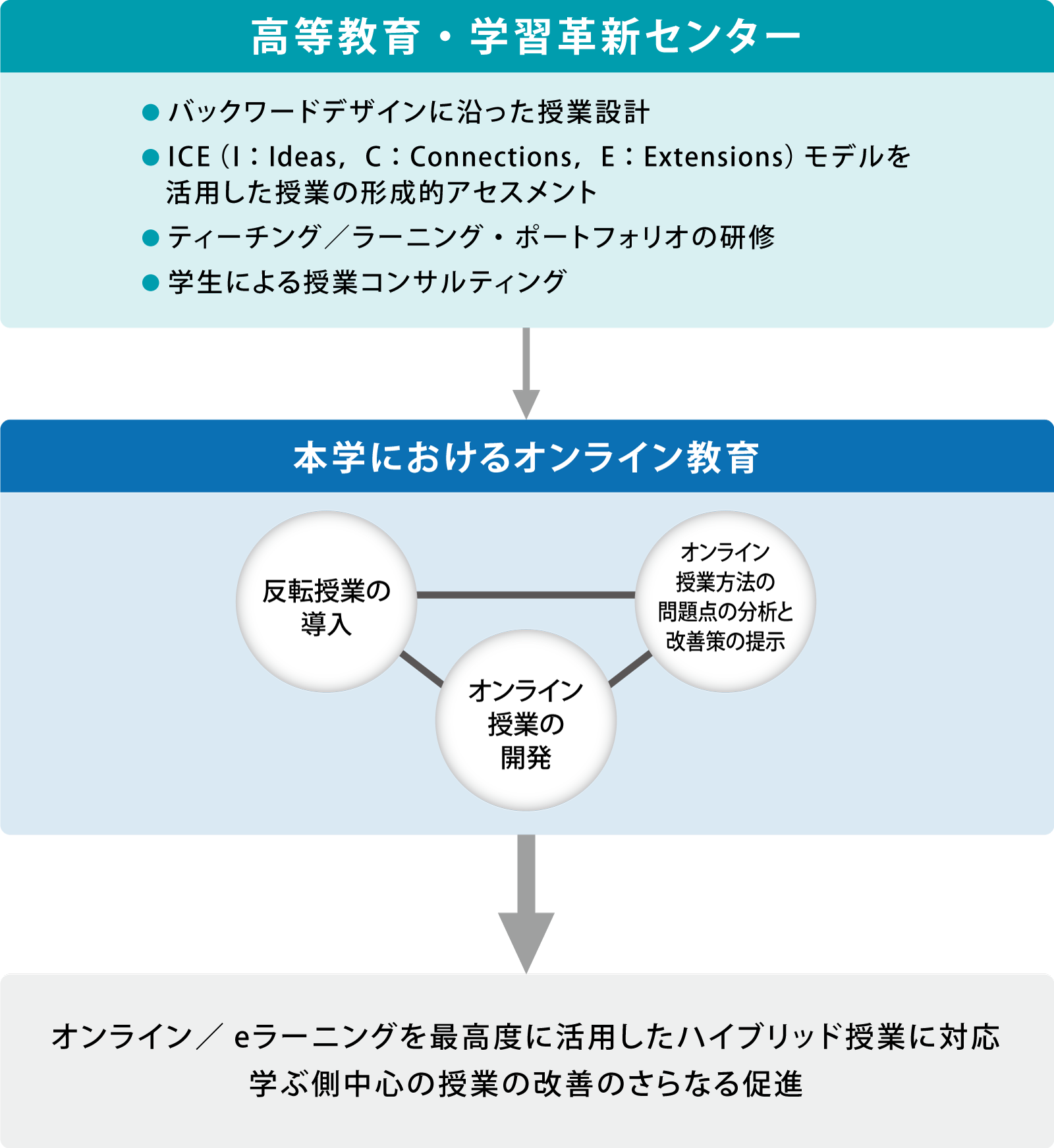The center to support education at The Kyoto College of Graduate Studies for Informatics
Establishment of the Center for Teaching and Learning Excellence (CTLE)
Many people from various backgrounds enter our university. The concept of "active learning" is important for the learning of these diverse students and for hybrid classes, which are increasingly in demand. Flipped classroom" and "Reflective Practice" are the key points in this context. "Flipped classroom" means that students study in advance (outside of class time) based on class videos and materials delivered by instructors, and then engage in learning activities to further deepen their understanding of the knowledge gained in the preparation through individual guidance from instructors and exercises during class time. In addition, "reflective learning" refers to the process by which students "look back" on their own learning process, leading to deeper learning. The Center for Teaching and Learning Excellence plays a role in supporting students to take the initiative in learning and reflective learning in the flipped classroom. The center is becoming more and more important as "independent learning" becomes more and more important in online hybrid classes.

Activities of the Center for Teaching and Learning Excellence (CTLE)
The activities of the Center for Teaching and Learning Excellence consist of three main pillars: "educational development and reform," "higher education research," and "learning promotion.
In "Education Development and Reform," the Center designs classes based on backward design, develops evaluation methods using ICE rubrics, promotes active learning in classes, and plans and manages training on teaching portfolios and learning portfolios. "In the area of higher education research", we conduct surveys and research on trends in higher education and learning in Japan and abroad. In the area of "Learning Promotion," we conduct research on Students Consulting on Teaching (SCOT), an initiative to improve and enhance the quality of classes from the students' perspective.
Toward the development of classes that reflect the needs of students
Until now, most university instructors have generally only assessed the performance of their students in answering questions on examinations that they themselves prepared. However, it is not possible to judge whether students have truly learned and acquired knowledge only by assessing the final examinations. True learning, which is most important for students, is "learning that takes root as knowledge and wisdom over a long period of time after the class.
In today's university education, a major problem is that there is little or no feedback to students on the quality of their learning. Feedback means to tell students how to improve their learning performance in the class. Even if there is no final evaluation of the student based on the "final exam", the student's learning itself will still be possible, but if there is no feedback in the above sense, learning will not be possible in the first place. For example, if a student is not told which question he or she made a mistake on an exam, the student will repeat the same mistake the next time when they take similar exam. As a result, they will not be able to receive a high evaluation.
Since the opening of our university, we have been conducting "class evaluation by students". In order to link this effort to "feedback on student learning" and to develop more advanced classes that reflect the needs of students, CTLE has begun a "Survey of and Response to Student Feedback on Classes.
This survey is modeled after The National Survey of Student Engagement (NSSE) used in the United States and Canada. Through this initiative, we aim to visualize the transformation of students and faculty.
To provide better classes
Since the university's inception, we have been conducting "Faculty Peer Evaluation". The Center for Innovation in Higher Education and Learning has come up with the idea of a new method called "Faculty Mentoring" to ensure that this good tradition of "faculty peer evaluation" is linked to the improvement of faculty teaching and to further enhance the teaching ability of our faculty. For classes that do not meet the needs of students, CTLE, which is composed mainly of pedagogical experts, collects comments from students about the teacher in question and assesses the situation. The Center then consults with the faculty member in charge of the class and provides advice on how to improve the teaching methods. As a result, teachers will be able to provide classes that are more student-friendly. Mentoring will also enable the teacher who is giving the advice (observing) to reflect on his/her own classes and improve his/her teaching skills.